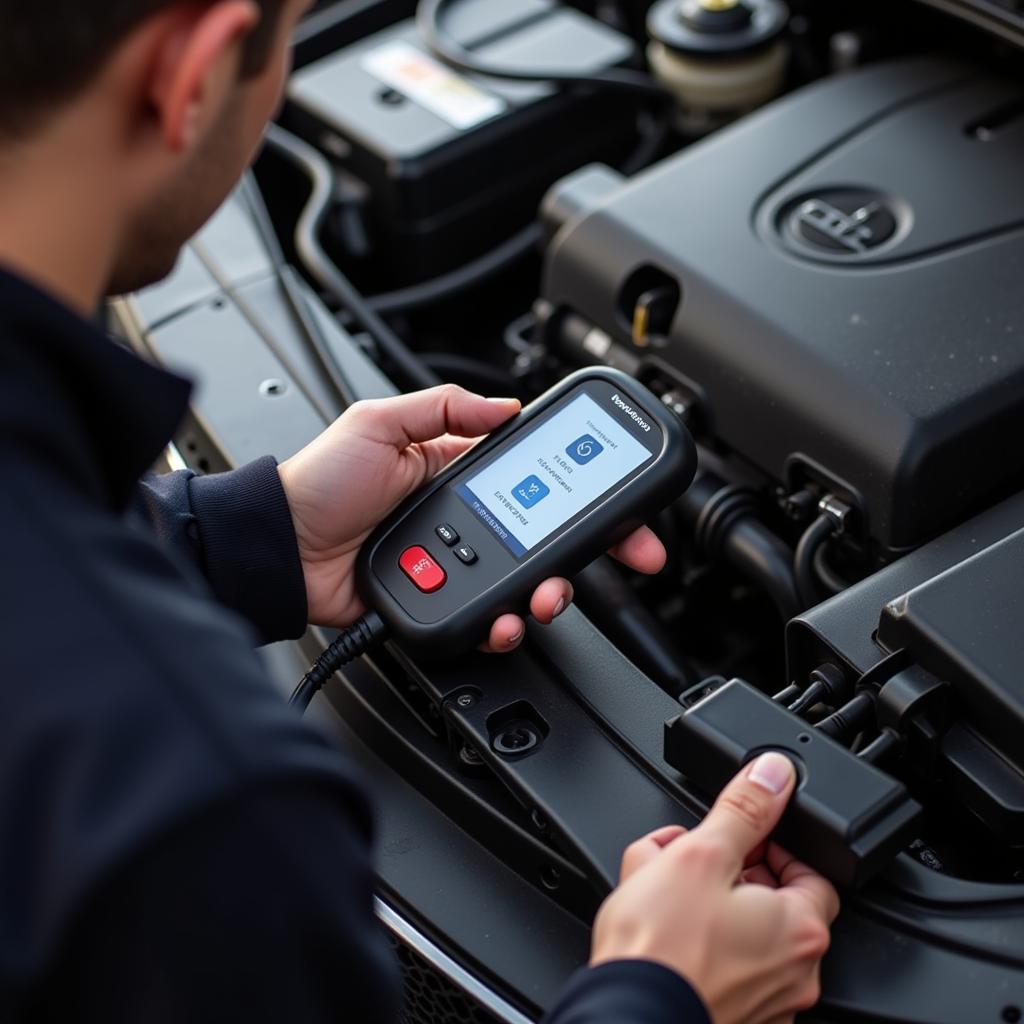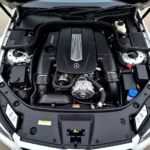A car diagnostic test, in its simplest form, is like a doctor’s checkup for your vehicle. It involves plugging a specialized tool, called a diagnostic scanner, into your car’s onboard computer system (OBD-II port) to retrieve valuable information about its health. This data can pinpoint issues with your engine, transmission, exhaust system, and other critical components.
Think of it like this: your car is constantly monitoring itself, keeping track of various systems and their performance. When something goes awry, it logs a trouble code. A diagnostic test reads these codes, acting as a translator between your car’s brain and your mechanic (or you, if you’re feeling tech-savvy!).
Why Are Car Diagnostic Tests Important?
Gone are the days of mechanics relying solely on their intuition and a trusty wrench. Today’s cars are complex machines, and a diagnostic test is often the first step in identifying and resolving issues.
Here’s why they’re crucial:
- Early Detection: Diagnostic tests can detect problems in their infancy, even before you notice any symptoms. This proactive approach can save you from costly repairs down the road.
- Accurate Diagnosis: Instead of relying on guesswork, mechanics can use the information from a diagnostic test to pinpoint the root cause of a problem, saving time and unnecessary repairs.
- Improved Safety: By identifying potential safety hazards early on, diagnostic tests contribute to keeping you and your passengers safe on the road.
- Increased Transparency: Diagnostic tests empower car owners with knowledge about their vehicles’ health, fostering trust and transparency between car owners and mechanics.
What Does a Car Diagnostic Test Tell You?
A car diagnostic test can reveal a wealth of information about your vehicle’s health. Here are some key areas it covers:
- Engine Performance: It checks for issues related to fuel delivery, air intake, ignition, emissions, and more.
- Transmission Function: It assesses the performance of your car’s transmission, identifying potential problems with shifting, fluid levels, and clutch operation.
- Exhaust System: It monitors the efficiency of your exhaust system, ensuring it’s effectively reducing emissions and meeting environmental standards.
- Braking System: It checks for faults within the anti-lock braking system (ABS) and electronic stability control (ESC).
- Airbag System: It ensures the proper functionality of your airbags and seatbelt pretensioners in case of a collision.
Types of Car Diagnostic Tests
While the basic principle remains the same, there are different types of car diagnostic tests:
- OBD-II Scan: This is the most common type, using the standardized OBD-II port to access basic diagnostic information.
- Enhanced Scan: Performed by dealerships or specialized mechanics, this delves deeper into specific systems for a more comprehensive analysis.
- Manufacturer-Specific Scan: This utilizes proprietary software and tools designed for a specific car make, offering the most in-depth analysis.
Common Reasons for a Car Diagnostic Test
Wondering when to schedule a diagnostic test? Here are some common scenarios:
- Check Engine Light: This is the most obvious sign. While the dreaded “check engine” light can indicate minor issues, it’s always best to get it checked.
- Performance Issues: Experiencing rough idling, reduced fuel efficiency, or strange noises? A diagnostic test can help identify the culprit.
- Pre-Purchase Inspection: Before buying a used car, a diagnostic test provides valuable insight into its mechanical condition.
- Regular Maintenance: Consider incorporating a diagnostic test into your regular car maintenance schedule for proactive care.
Can I Perform a Diagnostic Test Myself?
The world of car diagnostics is no longer exclusive to mechanics. Affordable OBD-II scanners are readily available for car owners who want to delve into DIY diagnostics. These user-friendly devices can read and clear basic trouble codes, providing valuable insights.
can you buy a car diagnostic machine
However, keep in mind that interpreting diagnostic codes and tackling complex repairs often require the expertise of a qualified mechanic.
How Much Does a Diagnostic Test Cost?
The cost of a car diagnostic test can vary depending on several factors:
- Location: Dealerships generally charge more than independent garages.
- Type of Test: Basic OBD-II scans are usually more affordable than enhanced or manufacturer-specific tests.
- Complexity of the Issue: If the initial scan reveals complex problems requiring further investigation, the cost may increase.
On average, you can expect to pay between $50 to $150 for a basic diagnostic test.
how much does a diagnostic cost on a car
What Happens After a Car Diagnostic Test?
Once the diagnostic test is complete, you’ll receive a report listing the trouble codes detected. A reputable mechanic will then:
- Explain the Codes: They’ll decipher the technical jargon, providing a clear understanding of the issues found.
- Recommend Repairs: Based on the diagnosis, they’ll suggest the necessary repairs and provide a cost estimate.
- Discuss Options: They’ll discuss your options, whether it’s proceeding with the repairs, seeking a second opinion, or considering alternative solutions.
Car Diagnostic Tests: Essential for Modern Car Care
In today’s technologically advanced automotive landscape, a car diagnostic test isn’t just a fancy option, it’s an essential part of responsible car ownership. From detecting issues early to ensuring accurate repairs, diagnostic tests keep your vehicle running smoothly and safely.
Remember, knowledge is power. Understanding the importance of car diagnostic tests empowers you to make informed decisions about your vehicle’s maintenance and repairs.
FAQs
Q1: Will a car diagnostic test drain my car battery?
A: No, a properly performed diagnostic test won’t drain your car battery. It consumes a negligible amount of power.
Q2: Can I drive my car with the check engine light on?
A: While it might be possible to drive for a short distance, ignoring the check engine light can lead to further damage and costly repairs. It’s best to get it checked promptly.
Q3: Does a car diagnostic test include the cost of repairs?
A: No, the cost of a diagnostic test is typically separate from the cost of any repairs needed.
where to get a diagnostic test on my car
what does a car diagnostic include
will car diagnostic pick up electrical faults
Need help with your car’s health? Contact our team of expert car diagnostic technicians today! We offer 24/7 support via WhatsApp: +1(641)206-8880, Email: [email protected].


